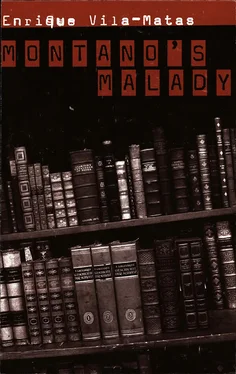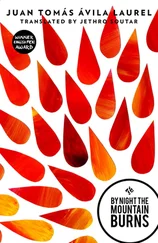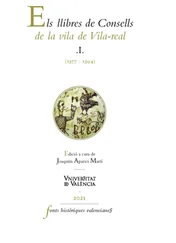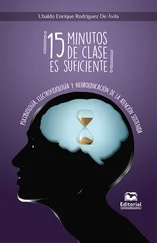A good plan for Montano. To follow Duchamp’s example and, like him, without surprise or suffering, to claim to be doing nothing. A good plan for my son, a plan that would enable him to escape from the constricted geometry of his blind alley. A plan as complex — it necessitated connecting a spider and Hamlet with Bloom and Duchamp — as it was basically very simple. In any case, a good plan for Montano. It came to me last night, as I lay wide awake in this hotel, but today, when I woke up, I had already forgotten it. However, the sudden irruption of Hamlet’s ghost into La Cigale brought it back to mind. All I had to do was ask him, innocent as can be, why Marcel Duchamp returns from the sea.
e) La Cigale is a historic restaurant, and not just because Jacques Demy shot his famous film Lola there in the 1960s. We were talking about all this and arguing about who should pay the bill when suddenly, possibly at the wrong moment, perhaps to stop him arguing about who should pay and also — why not say it? — trying in good faith to lend him a hand and to help him overcome his inability to write, at the wrong moment, I decided to ask him the question I had formulated in my hotel room.
“Why does Marcel Duchamp return from the sea?”
I know, I should have laid it all out and told him first about Bloom and the spider and all the paraphernalia of my literarily sick mind, which had led me to concoct this twisted but basically simple question intended subtly to help him — because I sought only to help him with this question that set in motion, I thought, my very well-intentioned Duchamp plan.
My son went from courting Hamlet’s ghost to becoming a monster that seeks revenge, also like Hamlet, I should add. The change in his expression was terrifying, his pupils suddenly dilated in a quite astonishing way, and, on answering me, he almost breathed fire:
“To see the sea.”
I remembered when he was a boy and one day, for no reason at all — unless it was to give us a good fright — the expression on his angelic face suddenly changed and turned into an enormous, horrible grimace, at which point he told us, warning us of his future literary calling, that the sea was paved with human faces, the faces of the dead. That day his mother, the ill-fated María, and I knew that our son would be difficult, though of course we had no way of knowing that later in Nantes he would choose to behave like Hamlet’s ghost in such an unstable way.
“I don’t think you understood me,” I replied today in La Cigale, “I asked you about Duchamp because it seems to me that living without writing, being a literary Duchamp, isn’t such a bad plan.”
I shall never forget his words or his deranged look, which suddenly sought revenge.
“Thanks to you,” he said, “thanks entirely to you, look what is happening to me at this precise moment: the memory of Gonzalo Rojas is infiltrating Justo Navarro’s and I am reliving the night when that poet wrote those verses in which Rimbaud paints the hum of vowels, Lautréamont howls at length, Kafka burns with his writings, Ezra Pound discusses an ideogram with the angels, and my mother, my poor mother …”
It was terrible, his pupils dilated even more.
“And my mother,” he continued, “listened to the piano recital that her charming murderer gave for her.”
At this point all I could think was how right Rosa was when she warned me that Montano, the one person who had inherited all my tastes and neuroses, was the least suitable human being in the world to help me dampen the obsessive presence of literature in my life.
At this point I clearly saw that remaining at Montano’s side could only make my illness worse. It was obvious that Montano’s malady, just like mine, was due to literature-sickness. And I told myself that, since Montano had inherited his father’s disease, I should name the illness after my son and call it Montano’s malady .
I looked at my son and confirmed my opinions. With his Hamletism, his aggressive theatrics, and his story about writers’ memories infiltrating the memories of others, Montano posed a real threat to his father and could only aggravate the latter’s literary illness.
“You killed her!” Montano suddenly exclaimed.
This was the last straw. He evidently believed that he was Hamlet and wanted to entrap the king’s conscience, my conscience.
“For crying out loud,” I answered, “I didn’t kill your mother!”
At this point Aline burst into tears.
It is raining outside, the rain is falling on Nantes and this hotel room is really very comfortable. But let’s get one thing straight: I did not kill Montano’s mother. Let there be no doubt. The idea that I murdered her is the classic literary construction of someone suffering from my son’s illness. It is raining on Nantes, and this reminds me of the Barbara song, where it also rained on the streets of this city. I gulp down two glasses of water in the hope that they will help mitigate the harmful effects of the evil, of my Montano’s malady. A moment ago I looked out of the window and saw a man with his arms half raised, in different positions, turning toward the mist — fairly thick at that time — as if he intended to enter it.
I did not kill his mother. What I do remember very well is the mad dash towards the balcony, the terrible jump in the air of María, the mother who left poor Montano feeling melancholy, the mother he won’t forget.
I remember in our house on Provença Street her deranged dash toward the balcony, which left the wood in splinters, her jump from the sixth floor with the indifference of a bucket of dirty water emptied out of the window by a housewife.
At the funeral, making out I was eternally bereaved, I read some verses by Eliot: “Ash on an old man’s sleeve / Is all the ash the burnt roses leave. / Dust in the air suspended / Marks the place where a story ended.”
I did not kill his mother.
Today in La Cigale, in an attempt to still the bloody thread of his runaway imagination, I said to him:
“All you ever do is revive the flies that suck my blood.”
I came out with this improbable sentence in part because I had again evoked the sea that he saw paved with the faces of the dead, and this reminded me of an old friend who always used to say that he wanted to crush two paving stones with the same fly. I came out with this sentence in part because of this and in part because I had the impression that my son, aware that I was suffering from Montano’s malady, sought to suck my blood and was trying to give me a final dose, a deadly overdose of literature.
This was not so very unusual, for my son simply to have it in mind to kill his father, a not uncommon desire in the West. The only strange thing was that he sought to do so by literary means. But, given Montano’s strangeness, nothing ever seems sufficiently odd. Whatever, the point is that, while I was in La Cigale, I understood that I could not run any more risks and that the best course of action was to leave Nantes as quickly as possible. I could not carry on hesitating like a vulgar Hamlet, wondering whether Montano was mad or simply pretending, or whether the poor boy was suffering on account of his inability to write (and that was all), or else he really did want to avenge his mother’s death, or he intended to aggravate my Montano’s malady by giving me his own and thus end up eliminating me by an overdose.
“What flies are you talking about?” he said. “You’re always trying to lecture me from your critic’s pedestal.”
This was all I needed. All I needed now was for him as an author to reproach me for being a critic. I stared at him with the most authoritarian expression I could adopt at that moment. And suddenly, I don’t know how it happened — I suppose it was due to the constant presence of Hamlet’s ghost — I remembered a gravedigger I once saw in Roses, singing while he dug graves. And immediately I remembered that in performances of Hamlet there is always such a character, a singing gravedigger.
Читать дальше












